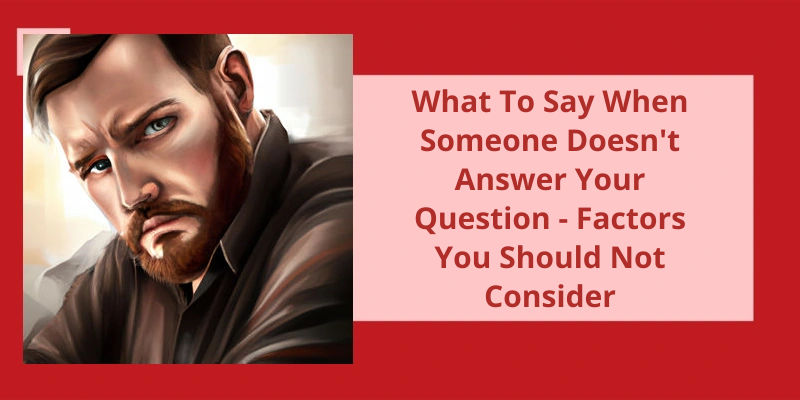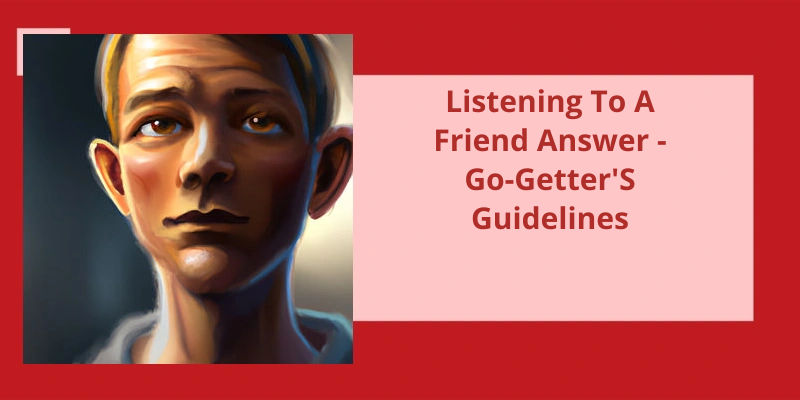Human communication is a rich and complex tapestry woven with questions, answers, and the unspoken exchanges that occur in between. But what happens when someone doesn't answer your question? How do you navigate the delicate balance between persistence and acceptance? It can be frustrating and perplexing when our inquiries go unanswered, leaving us with a sense of confusion and even annoyance. However, it’s essential to approach this situation with caution and a careful consideration of certain factors that may contribute to the lack of response. While it can be tempting to jump to conclusions or assume the worst, it’s crucial to avoid hasty judgments and erroneous assumptions. In this article, we will explore some of the factors you shouldn’t consider when someone doesn't answer your question, highlighting the importance of open-mindedness, empathy, and a willingness to engage in meaningful dialogue. By understanding these factors, you can effectively navigate these situations and foster more productive and fulfilling conversations.
How to Deal With a Person Who Doesn T Take No for an Answer?
When dealing with a person who doesn’t take no for an answer, it’s important to approach the situation with kindness and firmness. Begin by clearly stating your position and explaining your reasons for saying no. It’s crucial to maintain a respectful and assertive manner throughout the conversation.
Once you’ve said no, stick to your decision. Avoid giving in to pressure or manipulation tactics. It’s essential to hold your ground and stay firm in your response. Continually reiterating your refusal will reinforce your boundaries and make it clear that your decision is final.
If the person continues to push despite your efforts to be clear, it may be necessary to express your feelings of discomfort. Calmly communicate your concerns and explain the impact their actions have on you. Being open and honest about your emotions can help the person understand the consequences of their behavior.
If the individual still refuses to accept your answer and persists in disregarding your boundaries, it may be time to reevaluate the relationship. Consider whether this person respects and values your autonomy and boundaries. If their behavior consistently undermines your feelings and decisions, it may be necessary to distance yourself from the relationship for your own well-being.
Remember, it’s crucial to prioritize your own feelings and needs. You’ve the right to say no and maintain your boundaries. By firmly asserting your position, expressing your discomfort, and reevaluating the relationship if necessary, you can effectively handle a person who won’t take no for an answer.
Interactions can become challenging when someone refuses to directly answer your questions. Instead of allowing the conversation to drift away, address their evasiveness head-on. Explain how their avoidance makes you feel and politely inquire why they keep sidestepping your inquiries. By communicating your concerns firmly yet respectfully, you encourage them to listen and respond genuinely, ensuring a more meaningful conversation. However, if they express discomfort or unwillingness to answer, it might be worth reconsidering the question to maintain a respectful dialogue.
How Do You Respond When Someone Dodges Your Question?
When faced with someone who consistently dodges your questions, it’s important to address this issue directly. Instead of allowing your questions to go unanswered, it’s essential to inquire why they keep avoiding the topic at hand. By expressing your desire to receive a clear response, you can foster open communication and set the expectation that your questions should be answered. Moreover, emphasize how their evasion makes you feel, seeking to affirm that your concerns and inquiries deserve acknowledgement. This can help them understand the impact of their reluctance to answer and encourage them to actively engage in the conversation.
To ensure that your message is received and understood, it’s important to maintain focus on the question at hand rather than allowing the subject to divert. By respectfully redirecting the conversation back to your original inquiry, you can emphasize the importance of obtaining a response. Remember, staying firm in your request for an answer demonstrates your commitment to addressing the issue and promoting openness.
However, it’s also important to consider that some questions may evoke discomfort or unease in others, potentially leading them to shy away from answering. If the person explicitly expresses discomfort or states their unwillingness to answer the question, it may be worth reevaluating the nature of your inquiry. Reflect on whether the question may be too personal or invasive, and if necessary, choose a different approach or topic of conversation that allows for a more comfortable and open dialogue.
Strategies for Effectively Redirecting the Conversation to Get a Direct Response.
When someone doesn’t answer your question, it can be frustrating. However, instead of dwelling on their avoidance, there are strategies you can employ to redirect the conversation and hopefully get a direct response.
Firstly, ensure that you maintain a calm and respectful tone throughout. Getting defensive or confrontational will only escalate the situation and make it less likely for the other person to respond.
One approach is to repeat or rephrase your question in a slightly different way. This can prompt the person to reconsider their response and provide a more direct answer.
If the person continues to avoid answering, you can try using a bridging statement to steer the conversation towards the main point. For example, you could say, “I understand your perspective, but let’s focus on the main issue at hand. What’re your thoughts on X?” This helps to refocus the discussion and increase the chances of a direct response.
Another tactic is to provide context or share your own thoughts before asking the question again. By explaining why you’re seeking their input or sharing your perspective, you may encourage them to provide a more direct answer.
Lastly, if all else fails, you may need to directly address the person’s avoidance. Politely express that you’ve noticed they haven’t answered your question and explain why their response is important. This gentle reminder can sometimes prompt them to reconsider and provide a direct answer.
By employing these strategies, you can navigate conversations more effectively and increase the likelihood of getting the direct response you’re seeking.
It can be frustrating when someone doesn’t answer your question, but reacting with understanding and open communication is key. By politely asking if they’ve seen your question and expressing your curiosity about their response, you create an opportunity to address any potential reasons behind their silence and move the conversation forward.
How Do You Respond to Someone Who Doesn’t Answer Your Question?
When faced with someone who doesn’t answer your question, it can be quite frustrating and leave you wondering how to respond. One option is to politely ask them if they’ve seen your question, giving them the opportunity to acknowledge it and explain their lack of response. This approach allows you to express your curiosity and genuine interest in their input.
It’s important to consider that the person may have genuinely missed your question. With the hustle and bustle of everyday life and the constant influx of information, it’s not uncommon for messages or inquiries to slip through the cracks. By politely reminding them about your question, youre giving them a chance to rectify the oversight and provide the response youre seeking.
Another possibility to keep in mind is that something might be going on for the person. They might be dealing with personal issues, experiencing a busy period at work, or going through a difficult time emotionally. It’s important to approach the situation with empathy and understanding, as you never know what someone else may be going through. By inquiring about their well-being and gently reminding them of your question, you allow them the space to address any challenges they may be facing.
Additionally, it’s crucial to acknowledge that the person may have felt uncomfortable answering your question. Some questions can be sensitive or touch on personal topics that individuals may prefer not to discuss openly. By recognizing this possibility and approaching the conversation with empathy, you create a safe space for them to express their concerns or reservations. This understanding can help foster trust and facilitate open communication once they’re ready.
Ultimately, when someone doesn’t answer your question, it’s essential to focus on finding a solution rather than assuming the worst. By initiating a polite and understanding conversation, you’re more likely to receive the answer you’re seeking and gain a better understanding of the situation. This approach allows you to address any potential misunderstandings or barriers, helping you navigate the conversation and strengthen the relationship with the other person.
Strategies for Effective Communication When Someone Doesn’t Answer Your Question
- Be patient and allow the person time to gather their thoughts before responding
- Ask clarifying questions to ensure that the person understands your initial question
- Use active listening techniques to demonstrate your interest and understanding
- Try rephrasing or restating your question in a different way to make it easier for the person to answer
- Consider the person’s communication style and adapt your approach accordingly
- Avoid interrupting or pressuring the person for an immediate response
- Show empathy and understanding towards the person’s perspective
- Offer alternatives or options to encourage a response if the person is hesitant
- Be open to feedback and receptive to the person’s input
- Follow up with the person at a later time if necessary, allowing them more time to think
It’s frustrating when someone avoids answering a question directly, leaving the conversation in a state of uncertainty. This evasive tactic, commonly known as a non-answer, can take various forms such as evasion, avoidance, or dodging the question.
What Is It Called When Someone Doesn T Answer Your Question Directly?
When engaging in a conversation or seeking information, it can be frustrating when someone fails to provide a direct answer to your question. This kind of response is commonly known as a non-answer. A non-answer occurs when the person being asked evades or avoids addressing the specific question, often steering the conversation towards a different topic or giving an ambiguous response.
In some cases, non-answers may be given to intentionally confuse or mislead the questioner, especially in situations where deception or manipulation is at play. By skillfully redirecting the conversation away from the initial question, the person responding can prevent revealing information or expressing a clear stance on the matter.
It’s important to recognize that non-answers can hinder open and honest communication. They can create confusion, frustration, and even suspicion, as the intended recipient of the information may feel unheard or disregarded.
When faced with a non-answer, it’s helpful to restate your question in a clear and concise manner, emphasizing the importance of receiving a direct response. Additionally, it may be beneficial to communicate your expectations for open and honest conversation, encouraging the individual to engage in a meaningful dialogue rather than avoiding the question.
This practice can be frustrating, hindering transparent and effective communication. By confronting non-answers and promoting open dialogue, we can strive toward enhanced understanding and productive conversations.
The Psychology Behind Non-Answers: Explore the Reasons Why Some Individuals Choose to Give Non-Answers Instead of Directly Addressing a Question, Such as Fear of Judgment, Desire to Maintain Control, or Lack of Knowledge on the Topic.
The psychology behind non-answers is a complex phenomenon that involves various factors. Some individuals choose to give non-answers instead of directly addressing a question due to fear of judgment. They may be hesitant to reveal their true thoughts or opinions, fearing how others may perceive them.Another reason for non-answers is the desire to maintain control. By giving a vague or ambiguous response, individuals can manipulate the conversation or avoid divulging information they’re uncomfortable sharing.Additionally, a lack of knowledge on the topic can also lead to non-answers. Some individuals may feel embarrassed or insecure about their limited understanding, causing them to deflect the question.It’s important to remember that non-answers aren’t always intentional or malicious. People have personal reasons for avoiding direct responses, and it’s essential to approach such situations with empathy and understanding.
Conclusion
In conclusion, when faced with situations where someone doesn't answer your question, it’s important to approach the matter with respect, patience, and open-mindedness. Although it can be frustrating, it’s imperative to refrain from making assumptions about the other person's motives or intentions. Avoid jumping to conclusions or placing blame without sufficient evidence or understanding of the context. Instead, strive to maintain effective communication by rephrasing or clarifying the question, giving the other person the benefit of the doubt, and addressing any potential misunderstandings. Ultimately, focusing on positive and constructive approaches will contribute to better outcomes and enhance the overall quality of communication.






